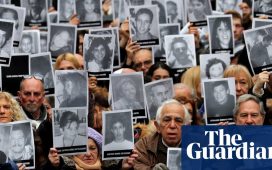Jeremy Irons, actor
Godspell opened in London in November 1971 and ran at the same time as Jesus Christ Superstar. It was the Rolls-Royce to our Ford Fiesta. I was 23, had just left the Bristol Old Vic company and was auditioning for everything. There were 30 of us lined up along the stage for the audition. I was on the end and taller than everyone else. I knew the Americans loved a level chorus line so I kept trying to sink down. I’d already done a few musicals including The Boy Friend and Oh What a Lovely War. But I’ve always said I sing like an actor and dance like a duck.
I knew Godspell was St Matthew’s Gospel told by a company of clowns. That was enough for me. I was cast in the dual role of Judas and John the Baptist. David Essex was Jesus. He was the variety boy, the lovable, cheeky one. As usual, I was the chap you’re not quite sure about. On the first day John-Michael Tebelak, the writer, asked all the actors to write a list of everything we could do – play the guitar, juggle, whatever. He took the lists and said he’d try to get it all in the show. That meant we all looked amazingly talented. I played my fiddle and planned to ride the unicycle, but when I found out we had a raked stage I wasn’t too keen.
There was a wonderful freedom. My understudy went on one night so he could have a crack while I went out into the audience to make notes on the show. We were a very democratic company and would give each other notes in the interval – sadly, that is unusual in theatre, that actors have the trust of each other like that. During Godspell I realised, on the stage, that this was a business I’d sort of wandered into instinctively and put on like a glove – and it fitted completely.
John-Michael was a great big cuddly teddy bear – a sort of hippy, bearded, fuzzy guy. We weren’t particularly religious but every night before curtain-up we’d do a huddle and say the Lord’s Prayer. If you do that show without a real respect for God and for Christianity, it doesn’t work. You have to imbue yourself with that spirit – and that’s what John-Michael gave us.

Stephen Schwartz, composer and lyricist
John-Michael Tebelak was a drama student at Carnegie Mellon in Pittsburgh who had thought of becoming an Episcopal minister. He went to a service one Easter and felt it missed the joy, energy and revolutionary quality of Jesus’s teachings. So he married theatre and theology together with the first version of Godspell in 1970. It had a book – based on the Gospel According to St Matthew – by him, songs by cast members and music from a student band. Students from Carnegie Mellon performed it, then took it to fringe venue La MaMa in New York.
Producers Edgar Lansbury (Angela’s brother) and Joseph Beruh decided it had commercial potential as a musical rather than a play with songs. I had met them previously when I had played them my score for Pippin, a musical I’d written about the son of Charlemagne. They must have called every experienced musical theatre composer in New York first, then said: “What about that kid with the weird musical?”
I went to the final performance of what was then called The Godspell and signed on to write new lyrics and music. What I found most brilliant in John-Michael’s show was that it was very funny. Without mocking religion, it found humour in people interpreting the parables. We were told we were going into rehearsal in five weeks. I jumped in. But that sounds like a more impressive feat than it was – most of the lyrics I wrote were derived from the Episcopal hymnal or paraphrased Bible verse.
We opened at the tiny Cherry Lane theatre off-Broadway in May 1971. It was like kids putting on a show in a barn. The audience got up on stage during the interval to have wine and dance with the cast. Actors played charades with the audience. It quickly turned into a phenomenon and opened on Broadway and in London.
It was a time when were very divided as a nation and there was an appetite for its message of unity. We even performed before the pope! We refused to allow it to be produced in South Africa unless it was with an integrated cast and audience. Apartheid was too entrenched for it to play Johannesburg, but they caved in Cape Town where we broke the apartheid rules.
Initially, Godspell had a broad acceptance by religious groups and theatregoers alike. But, after a decade or so, there was suddenly great resistance from more conservative religious groups – having a Jesus character in a Superman shirt was deemed offensive, and there were murmurs about the lack of a resurrection in the show. We answered that the curtain call was the resurrection – Jesus runs on and takes a bow with everyone else while they sing Day By Day. But Godspell was not about whether Jesus was divine, in the way that Jesus Christ Superstar is. It was about what this character taught and how his lessons changed society.






